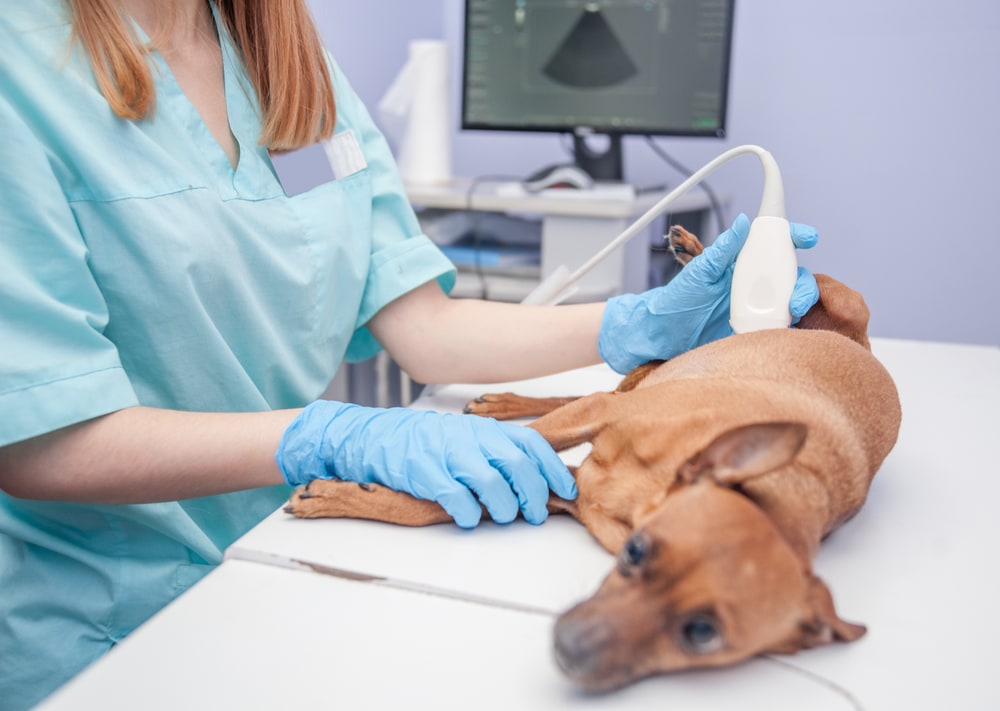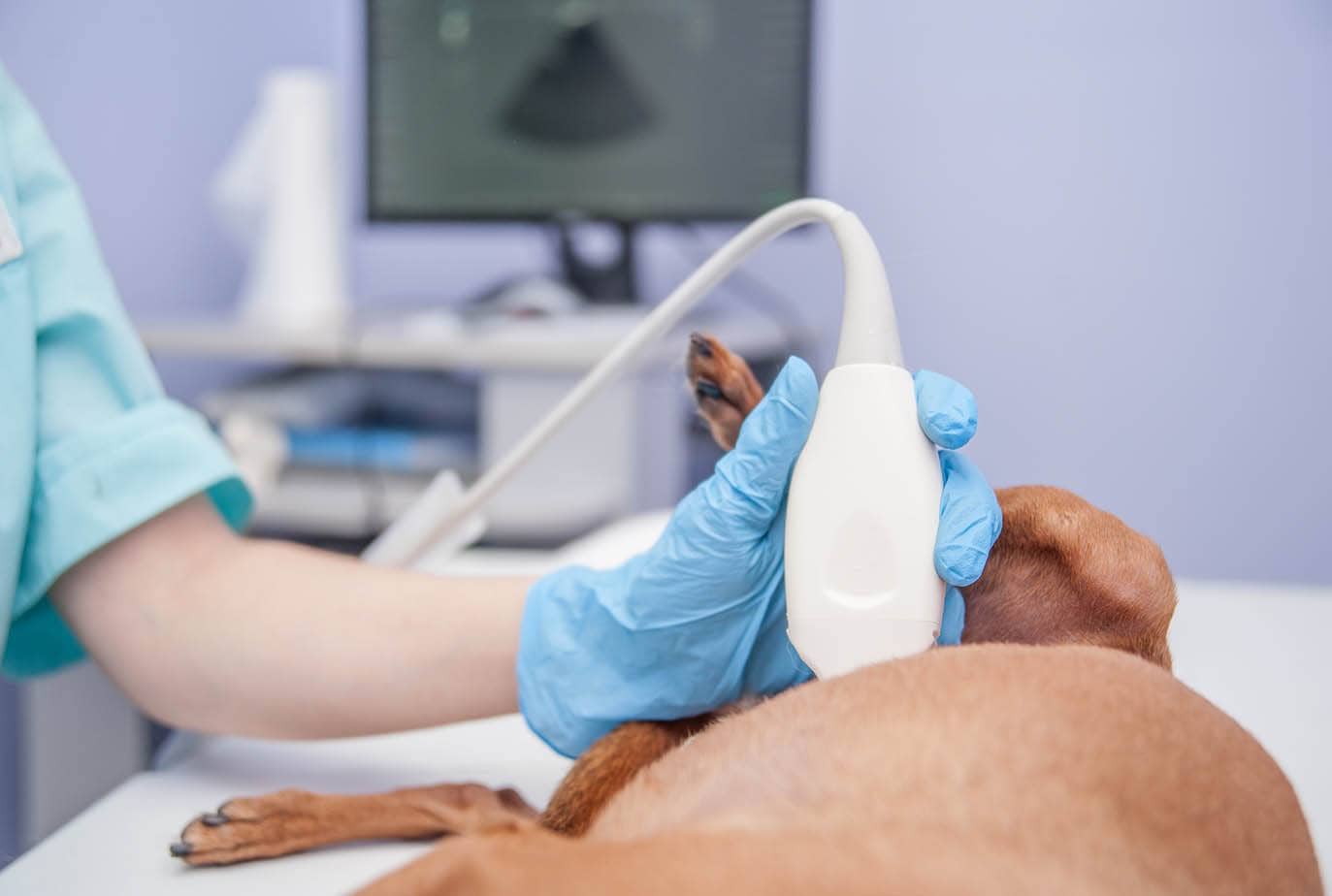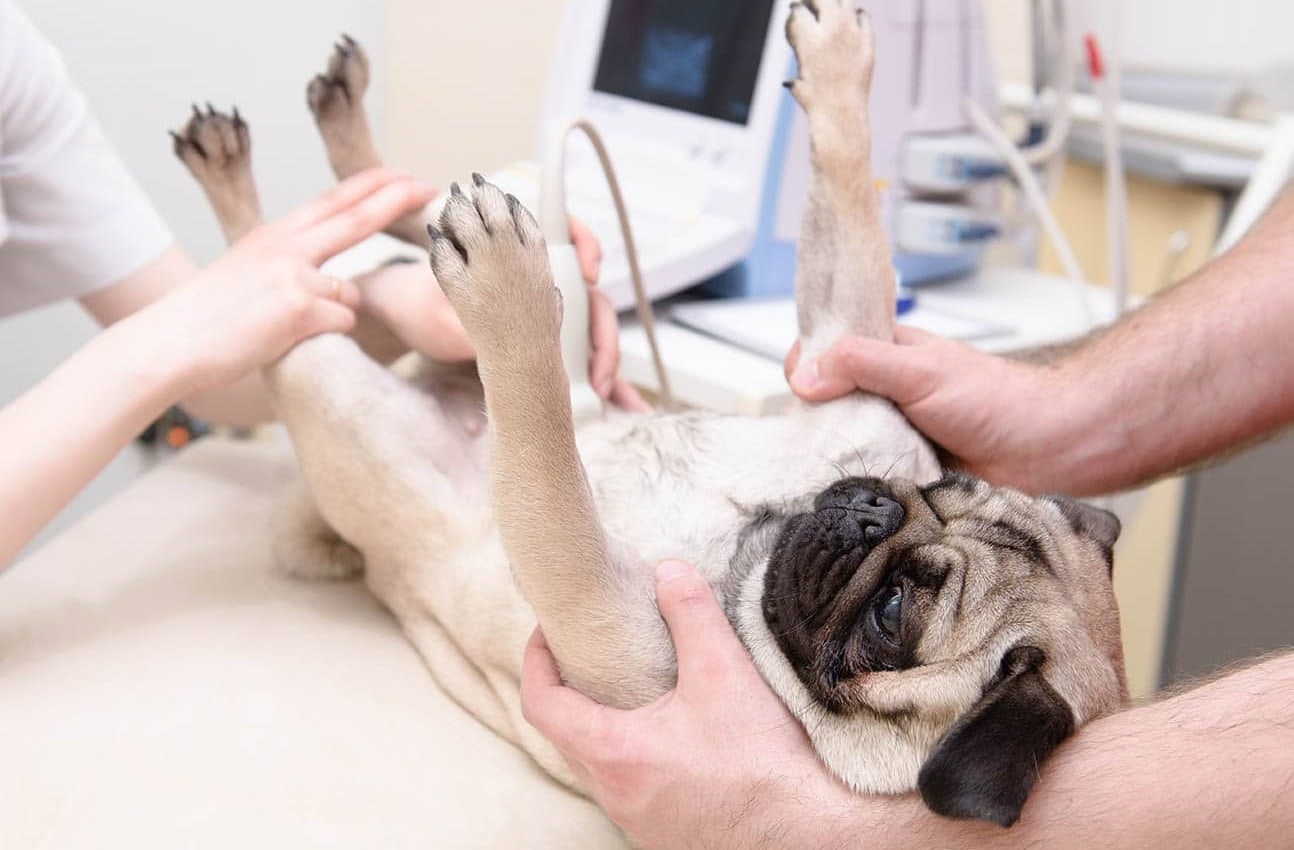
[ad_1]

Nobody can deny just how much healthcare has advanced in the last few decades. Those advancements have brought significant advancements in veterinary medicine as well. One such benefit of human healthcare that has crossed over into vet medicine is ultrasounds. Ultrasounds are becoming far more accessible, with a huge number of specialists and primary care vets offering these tests. Should you expect a high price tag, though?
The Importance of Ultrasounds
If you have a dog that has not experienced medical problems before, you may not fully understand the importance of ultrasounds. However, if you have a dog that has required an ultrasound at some point, then you likely fully acknowledge how essential it was to your dog’s care.
Ultrasounds allow your vet to view the inside of your dog’s body without having to perform invasive surgeries. To the untrained eye, the ultrasound view on the viewer screen likely looks like nothing, but a trained vet will be able to get a good idea of internal processes in your dog’s body.
Ultrasounds can be used for a multitude of purposes, from monitoring pregnancies to diagnosing cancers and organ defects. They can even be used in some instances to identify the source of internal bleeding with minimal risk to the dog.
How Much Does a Dog Ultrasound Cost?

How much your dog’s ultrasound costs will depend on the vet you see. Some primary care vets will provide ultrasounds, and if this is the case, you can expect the ultrasound itself to cost $200–$350. This is unlikely to include your visit fee or any additional tests. If you are planning to take a copy of the ultrasound to a specialist, then your vet may charge a fee to copy the images to a disc. However, this isn’t always the case because these images can usually be sent via email now.
If your dog sees a specialist for its ultrasound, then you should expect to spend $400–$500 for the ultrasound. Again, this is unlikely to include the visit fee and additional testing the ultrasound results may lead to.
Additional Costs to Anticipate
It can be difficult to know exactly what additional costs you should anticipate if your dog needs an ultrasound because additional costs will be entirely determined by the diagnosis your dog receives.
When you take your dog in for an ultrasound, you can likely expect a visit fee, which can exceed $100 if your dog is seeing a specialist. Ultrasounds are often performed without sedation, but an uncooperative or aggressive dog may require sedation, which will tack on additional charges for the sedation, pre-op blood work, and sedation monitoring.
The best way to understand what additional costs to expect is to talk to your vet’s clinic prior to your visit and request an estimate. In most cases, the ideal type of estimate to receive is one that shows the high and low end of expected costs. The more care and interventions your dog requires, the more charges you can expect.
If your budget is tight, make sure to clearly communicate to your vet clinic that you need to receive any cost updates before additional tests and procedures are performed.
How Often Will My Dog Need an Ultrasound?

The good news is that many dogs only require an ultrasound one time for diagnosis purposes, and they often don’t require repeat ultrasounds. This greatly depends on what’s going on with your dog, though.
Pregnancies may require multiple ultrasounds to monitor the development of the pups, while certain cancers and organ defects may require routine ultrasounds to monitor for changes. Your vet will be able to give you a good idea of if they expect your dog to continue needing follow-up ultrasounds.
Does Pet Insurance Cover Ultrasounds?
Many pet insurance companies will cover ultrasounds. The primary exception to this is if your dog receives an ultrasound related to a pre-existing condition. Most insurance companies will not pay for any care, tests, or medications related to pre-existing conditions.
There are one or two exceptions to this, so make sure to talk to your pet insurance company before expecting coverage for ultrasounds related to pre-existing conditions.
If your dog’s ultrasound is not related to a pre-existing condition, then it’s extremely likely that your pet insurance will cover the ultrasound, leaving you with only your portion of the copay.
The Importance of Follow-Up Visits

It’s extremely important that you maintain any follow-up visits that your vet recommends regarding the care of your dog after their ultrasound. This is especially important if your dog has been diagnosed with a chronic or life-threatening medical condition via their ultrasound procedure. Follow-up visits allow your vet to closely monitor everything from your dog’s appearance to their blood work, and they may even perform follow-up ultrasounds for monitoring purposes.
If the financial aspect of regular follow-up visits is a concern, talk to your vet about your monetary constraints. Let them know what you’re comfortable spending, and ask them about financial support options. Many vets accept forms of payment like Care Credit and ScratchPay to better help you provide care to your dog. If you are an established client, your vet may also be able to work out a payment plan with you, but this should not be the expectation on your part.
Conclusion
Ultrasounds can be lifesaving for a dog experiencing a serious medical condition, they can allow monitoring for the health and safety of pregnancies, and they can monitor changes in your dog’s body after a surgery or treatment. Ultrasounds can become costly, and they are often associated with specialist care, so make sure you get estimates before your vet performs the ultrasound so you can better budget for any expenses that may arise related to your dog’s care.
Featured Image Credit: Ermolaev Alexander
[ad_2]
Source link




